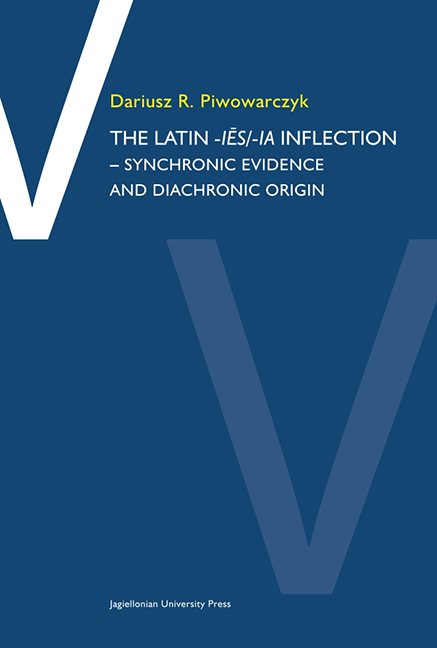Chapter three - The -iēs/-ia nouns – synchronic and diachronic evidence
Published online by Cambridge University Press: 16 July 2022
Summary
Presented in the following list are the attested -iēs-type, -iēs/-ia-type, -itiēstype and the itiēs/-itia-type nouns as excerpted from Gradenwitz (1904: 446- 447), Mikkola (1964: 182, 1966: 121-123), Delatte et al. (1981: 412), Busa (1988: 287), Brosman (1987) and Daude (2002: 231ff.) in alphabetical order. For each form the synchronic situation is presented – the meaning accoding to the OLD, the first attestation of the form in -iēs and the -ia one (if existent), transparent derivational source visible in Latin, if attainable. Following the synchronic analysis is the diachronic one with comparative evidence drawn from the other Indo-European languages. The etymologies of every word are presented as found in the literature.
The -iēs/-ia-type stems
Table 2 presenting the -iēs forms in Latin alongside the place of their earliest attestations and the ia-by forms and their attestation.
Discussion of the forms:
ACIES – aciēs, -ēī ‘sharpness, a sharp edge (esp. of a weapon), point, battle array, sight, pupil of eye;’ earliest attestations: Ennius, Plautus, cf. WH: I 8, OLD: 28, EM: 8-10. Descriptively, the word seems to be the abstract to the adjective ācer ‘sharp, pointed’ but the initial vowel length of the latter speaks formally against this assumption. Theoretically one could also think of deriving it from the verb acēre (so de Vaan 2008: 21) but the semantics here does not seem very probable: the meaning of acēre is very specialized: ‘to be sour (of wine)’ while that of aciēs remains very broad. Connected with acēre is the noun acētum ‘vinegar’ (cf. Weiss 2009: 293). However, it is also thinkable that acēre might have at some point in time meant ‘to be sharp’ and been the basis for the abstract noun meaning ‘sharpness’ before the meaning of the verb developed further into a specialized one ‘to be sour.’
When we take into account the comparative evidence, the picture becomes clearer. Aciēs has cognates in Germanic: Old Saxon eggja, Old High German ekka, Modern German Ecke ‘edge’ which all point to the Proto-Germanic *aǥjō. This in turn should be the development of the Proto-Indo-European *ak-ieh2 < *h2eḱyeh2. The presence of the -i-abstract in aciēs alongside the adjective in -r- (cf. Greek akrós < *h2eḱ-ró) points most probably to the Caland suffix (cf. Nussbaum 1976a: 15, Rau 2009: 74).
- Type
- Chapter
- Information
- The Latin -iés/ia Inflection , pp. 19 - 124Publisher: Jagiellonian University PressPrint publication year: 2022



